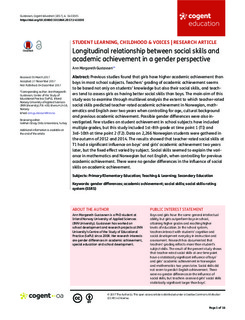Longitudinal relationship between social skills and academic achievement in a gender perspective
Journal article, Peer reviewed
Published version

View/
Date
2017Metadata
Show full item recordCollections
Original version
Cogent Education. 2017, 4 (1), 1-16.Abstract
Previous studies found that girls have higher academic achievement than boys in most school subjects. Teachers’ grading of academic achievement seems to be based not only on students’ knowledge but also their social skills, and teachers tend to assess girls as having better social skills than boys. The main aim of this study was to examine through multilevel analysis the extent to which teacher-rated social skills predicted teacher-rated academic achievement in Norwegian, mathematics and English over two years when controlling for age, cultural background and previous academic achievement. Possible gender differences were also investigated. Few studies on student achievement in school subjects have included multiple grades, but this study included 1st–8th grade at time point 1 (TI) and 3rd–10th at time point 2 (T2). Data on 2,266 Norwegian students were gathered in the autumn of 2012 and 2014. The results showed that teacher-rated social skills at T1 had a significant influence on boys’ and girls’ academic achievement two years later, but the fixed effect varied by subject. Social skills seemed to explain the variance in mathematics and Norwegian but not English, when controlling for previous academic achievement. There were no gender differences in the influence of social skills on academic achievement.
